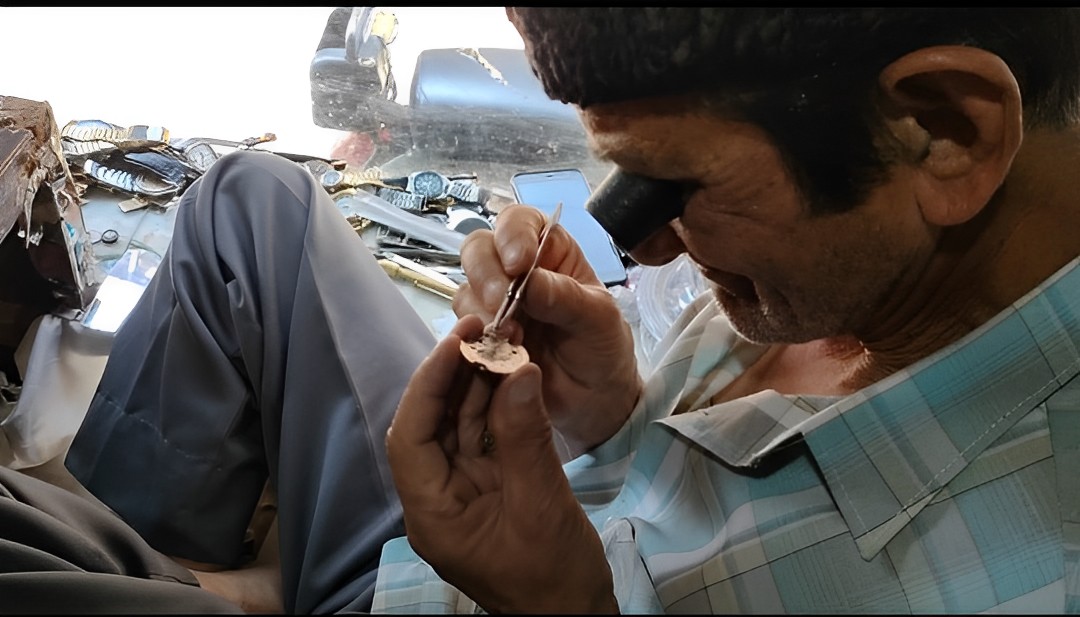In bustling Srinagar, Aiman Fayaz meets a watchmaker who is unwilling to give up even though digital watches have already taken over the sector.

In those days, the watchmaker’s shop located at the city’s core stood as a symbol of progress, representing the city’s flourishing prosperity. Visitors from far and wide would flock to admire its grandeur, deeming it the city’s iconic landmark
But time is a fickle thing. The erstwhile symbol of progress, the shop stands abandoned, its windows boarded up and its door hanging off its hinges. It is a forgotten ruin. In its current dilapidated state, the shop is still a testament to the ever-changing nature of the world. It is a silent reminder that nothing lasts forever. It remains a monument to its past, reflecting the city’s history and potential for growth.
Watch Repair
Muhammad Shafi, a sexagenarian, takes a sip of his tea and closes his eyes as if hearing the strains of old songs that played on the radio when his father was alive. His mentor and trainer, he remembers his father’s deft hands repairing the delicate mechanisms of old watches and clocks.
“As a teenager, I was a curious explorer searching for the secrets hidden within the delicate mechanisms of old clocks,” Shafi said. “Whenever I had the chance, I would sneak into my father’s shop and immerse myself in the world of ticking timepieces. With each clock opened, I felt like a scientist, uncovering the tiny parts of the watches, one gear at a time. I was fascinated by how the gears and springs worked together to keep time.”
The Decline
For fifty years, Shafi has been a fixture in his shop, a steady presence amid the ever-changing tides of the market. He has seen the city’s colours shift and witnessed trends come and go. Most importantly, he has seen his business rise and fall. “People used to travel from Doda district, just to get their watches fixed here. And I am not even bragging,” he recalls with a hint of pride. His shop is small but full of history. Shelves line the walls with watches, old and new, clocks of all shapes and sizes, and some with musical instruments.
Shafi said he believed that a watch is not just a timepiece, but a piece of history. So, he would take time to understand each watch’s problem, finding a way to fix it.
This would help him revive even the most broken timepieces. A master craftsman, his valued work once fixed the grand clocks of shrines with ease and precision.
The Impact of Technology
Time is dynamic, it changes. The rise of digital watches and clocks led to Shafi’s business decline. He found less work and his income dwindled.
“My work was highly valued, and I earned good money,” he lamented. “Now, I hardly make Rs 100 a day. Old friends visit out of sympathy, asking me to change watch batteries.” Saddened but not bitter about the decline, he knew the changing world required adapting. He learned to repair digital watches and clocks. He also offered new services like cleaning and battery replacement.
As a watchmaker crafting each timepiece with skill, he was a keeper of time. But as the world shifted to digital, his valued art became a relic. He struggled to get by. Unlike other watchmakers who switched professions, Shafi stayed in his shop, driven by his love of his craft.
“Lal Chowk was once a bustling hub of traditional watchmakers,” Shafi said. “Each artisan made exquisite timepieces with skill and care. But digital things pose a grave threat. Many switched professions since they had the means. I stayed because this shop is all I know.”
Uncertain Future
Shafi had a talent for repairing almost all brands like HMT, Timex, Titan and Omega. “Back then, wearing a Titan watch meant you were the wealthiest around,” he talked about how the wristwatch showed status and not time alone. He used to import parts for these watches from outside Kashmir. As time passed, available parts declined, causing a shortage.
Despite this, Shafi kept working hard, finding new ways to repair watches. “After parts got scarce, I would sometimes use forgotten parts from customers’ watches to help those in dire need,” he said with a laugh. HMT, which used to import spares from Japan, had a major factory in Kashmir, in Shariefabad.
The HMT factory went into decline gradually and eventually closed down. It shocked the watch business and repair sector. Many gave up but Shafi refused to quit because he knew he had a talent and would survive. He eventually opened a new repair shop of his own and has worked there since.
“I was optimistic about working for HMT Srinagar,” he recalls his unfulfilled wish. “They paid generously, and I eagerly wanted to join.”
That time technology is now past. The young use smartphones and smartwatches that monitor health conditions too.
The last watchmaker in his family and perhaps in the city, Shafi fears that with his eventual passing, the tradition will be lost. For a person, it is painful to see his asset devastating. His shop now fills with cobwebs, facing potential closure. His son will inherit the shop but not its speciality.
“I will keep it open as long as I can,” a determined Shafi said. “I may not make a living anymore, but I won’t let this tradition die.”















